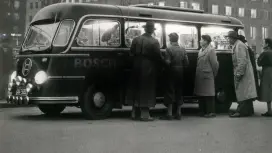The history of the apprentices’ workshop and occupational training at Bosch
“A testimonial from Bosch was always worth a lot”
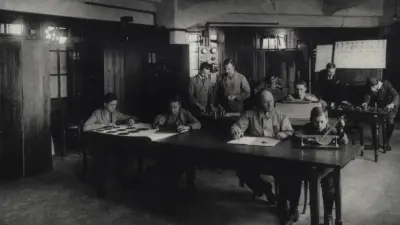
Bosch did not want its apprentices to be either cheap workers or one-sided specialists. To allow them to get off to a good start in their professional lives – at the company or elsewhere – Robert Bosch himself took great care to ensure that they got a broad-based education.
The company founder’s education
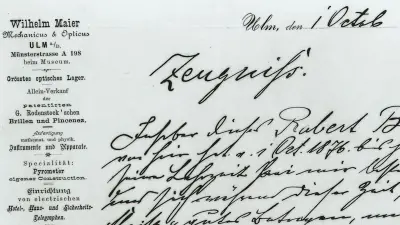
“I have had this file for 12 years, and now suddenly you tell me it’s no good anymore.” Mr. Maier, Robert Bosch’s master at the shop in Ulm where he was an apprentice, was not pleased. What happened? Robert, a young precision mechanics apprentice, had asked for a new file because the old one was simply dull. But his master, under whom young Robert apprenticed from 1876 to 1879, wasn’t interested. In fact, he didn’t spend much time on his apprentices in general. Looking back on this time many years later, Robert Bosch wrote: “Not only did my master seldom show his face in the workshop, he did not even encourage learning.”
Lessons from an apprenticeship
These experiences made Robert Bosch determined to devote a lot of attention to apprentices in his own workshop, which was founded in 1886. He never took on more than two at a time, and he supervised them personally. To spur them on, and if he believed in them and their skills, he gave them challenging tasks. It also wasn’t long before he sent them out to visit customers on their own. However, as the company expanded, he was no longer able to supervise the apprentices himself, and delegated the task to individual master craftsmen. The more the company grew, the more specialized the work done by the individual departments became – and that also meant the masters were more specialized in working with apprentices. However, Robert Bosch felt that it was very important for apprentices to get a multifaceted and systematic education, so he opened a workshop specifically for apprentices in Feuerbach on April 1, 1913. All of the company’s apprentices were assigned to work there. To act as shop manager, he hired a former companion from his journeyman days named August Utzinger. Utzinger modernized the Bosch apprenticeship program and taught the young people both theory and practice in rooms specifically designed for this purpose. Training spots at Bosch were highly coveted, as “a testimonial from Bosch was always worth a lot.”
In the early days, Bosch hired 30 to 35 apprentices a year for the new workshop. With Bosch only wanting the very best, candidates had to take a challenging entrance exam. Hans Walz, the first successor to Robert Bosch, used the 25th anniversary of the apprentices’ workshop to stress how important this was: “Mr. Bosch regarded the cultivation of hard-working, skilled young people as extremely important for maintaining performance and international competitiveness.”
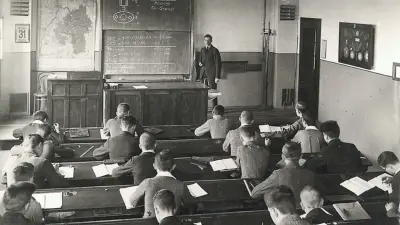
Apprentices from the UK astonished to find female counterparts at Bosch
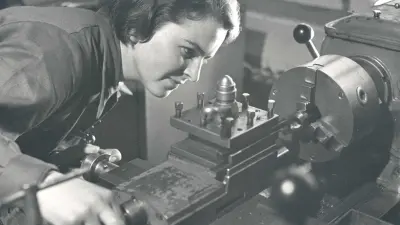
Training places at Bosch are so highly coveted because a large, global company not only offers opportunities for promotion but also potential for professional and personal development on an international level. The first mention of the possibility of an exchange between young German and English skilled workers appeared in Bosch-Zünder in 1954. The young men from the UK were amazed at three things they discovered on arriving in Stuttgart: there were female apprentices, which was obviously not the case back home at that time; it was still customary to serve beer during breaks; and many Bosch employees spoke English very well.
Then, as now, good foreign language skills were an important prerequisite for any exchange. However, associates travel to rather more far-flung destinations these days. For example, mechatronics apprentices from the Bosch plant in Homburg traveled to Beijing in the summer of 2012. Both professionally and culturally, they were impressed by what they experienced: “There are no harsh tones or loud voices here – people are very careful to ensure everything is said very politely and both parties must be satisfied before they end a conversation.”
Different countries, different training programs
Depending on the individual country and location, occupational training at Bosch can differ. Germany follows what is known as a “dual” system, in which apprentices are trained in state vocational schools on the one hand and in a company’s dedicated apprentices’ workshop on the other. Training is standardized and recognized nationwide by all companies. Similar models are in place in other countries, such as the organized technical-industrial training provided at Bosch in Switzerland. The first apprentices were hired there in 1920, and in 1928 a regulated technical-commercial training.
Bosch established an apprentices’ workshop in Brazil in 1960. Nelson Mulato started his training there. At that time, nearly 30 candidates would apply for one apprenticeship. Mulato passed the selection process and is grateful for his time at Bosch: “My group got to the vises first. We assembled the imported machines and waited for instructions from the trainers. I believe my training at Bosch was the single most important thing in my career!”
These days, Bosch is taking the concept of dual vocational training and education to more regions. In cooperation with the Chamber of Commerce and Industry and the German international chambers of commerce, the company is working to establish dual systems modeled on the German system in countries like China, India, Vietnam, Brazil, and Türkiye. At the end of 2023, there were nearly 6,000 apprentices at Bosch worldwide, about 4,000 of them in Germany.
New paths – the changing face of training
While Bosch initially only offered training for precision mechanics and toolmakers, changes in the working world meant more and more occupations were added as time went on. There is now a wide spectrum of occupational training opportunities in the fields of business, technology, and IT, ranging from classic jobs as industrial mechanics and industrial business administrators to more contemporary occupations such as mechatronics engineers, IT specialists, or business administrators focusing on digitalization. The number of dual bachelor’s degree programs has grown as well. The ever-shifting requirements of the working world at Bosch continue to shape the training process today. In particular, it is no longer possible to teach all the precise skills needed for a future career on a one-to-one basis. That makes it especially important to give new recruits training that will enable them to identify and resolve problems and keep on developing ideas with new content. Working with the latest technology is also important.

